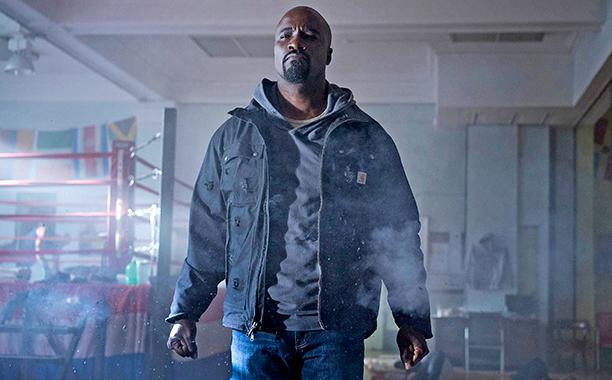Luke Cage Is Not Just Relevant — It’s Excellent
Scene from Marvel’s TV Series Luke Cage.
October 6, 2016
Someday, there will be classes on how Marvel Entertainment has managed to maintain the superhero genre for over a decade. For now, though, we must construct our own arguments on the topic. Thus far into examination, one theory emerges: Marvel understands that there is no such thing as the superhero genre. Rather, superheroes are mythic figures who upend the mechanics of other genres. “Captain America” is a film with a super soldier caught in the government thriller. “Jessica Jones” is a neo-noir thriller in which the hard-boiled detective is fighting someone who can literally alter minds.
And with its newest show “Luke Cage,” Marvel has another brilliant example — what is already a tightly-knit, enthralling organized crime drama becomes something near unprecedented by adding a modernized black superhero who can punch through walls.
Frankly, it would have been a great series without the titular hero, as the core story of gangs fighting for and shaping the soul of Harlem is compelling on its own. The writers fully embrace that Harlem isn’t just the location the plot takes place in — it is the emotional heart the plot is built upon. The central villains this time around aren’t as much interested in money or personal gain; these things are some of the very few stepping stones on the way to living a lifestyle equal to social elites while being Black in America — and what’s more, black in Harlem.
The best visualization of this theme is the episode “Harlem’s Paradise,” inside a refurbished club with extreme sentimental value that contrasts with drab palettes of the series with vibrancy and color. The constantly changing power is characterized by whoever is sitting in the VIP section. That simple creative choice hammers home that the show isn’t about superheroes, but about how achieving a heroic status and prominence is altered based on race in America. The concept is perfectly capitalized upon by a painting of Biggie Smalls with a crown hanging in the main office. The message is clear: it’s not enough to be successful. You have to be a king to get respect.
The theme is also carried by another pair of excellent Marvel TV villains. Cottonmouth (Mahershala Ali) creates a charismatic and terrifying character, holding his own against the likes of past bad boys Kilgrave and Kingpin and displaying just enough humanity that viewers become genuinely furious at themselves for trying to empathize. And his cousin Mariah Dillard (Alfre Woodard) is one of the most morally intriguing characters in Marvel’s pantheon, because there’s little question she genuinely wants to revitalize Harlem, but would rather be doing everything through more legal routes.
But when an arms deal goes south and results in a shootout at the local barber shop, ex-convict Luke Cage (Mike Colter) is forced into the role of reluctant hero. Cage might be one of the best modern revisions of a character, because the creators realized the mere existence of the character is still relevant today. They understood the implications of a black man with bulletproof skin in 2016, and more than that: they gave him a hoodie. It also helps that Colter captures the quiet fury of Luke Cage perfectly.
As far as gritty, crime dramas featuring superheroes go, I think Cage largely trumps the most recent Batman films in terms of capturing a narrative in which a superhuman upsets the balance of power in gangland. Even when Cottonmouth finds a way to coexist with Cage, he insists on fighting him, because Cage isn’t a costumed vigilante. He’s a regular guy with powers who challenges Cottonmouth for the face of Harlem. That’s how you transcribe the emotions and stakes of a crime film and add superheroes.
This isn’t even a quarter of what could be discussed, but “Luke Cage” really needs to be seen to be believed. It proudly stands alongside “Jessica Jones” as another home run, and regardless of what you think quality-wise, it’s hard not to love its ambition, boldness and commitment to being a story about blackness in America. It just also happens to have superheroes.
Email Carter Glace at [email protected].















































































































































